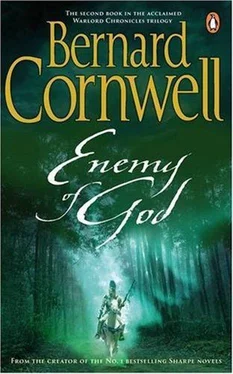Thus Arthur disposed the golden future.
But he did not reckon on Merlin. Merlin was older, wiser and subtler than Arthur, and Merlin had smelt the Cauldron out. He would find it, and its power would spread through Britain like a poison. For it was the Cauldron of Clyddno Eiddyn. It was the Cauldron that broke men’s dreams. And Arthur, for all his practicality, was a dreamer.
In Caer Sws the leaves were heavy with the last ripeness of summer.
I had travelled north with King Cuneglas and his defeated men and so I was the only Dumnonian present when the body of King Gorfyddyd was burned on Dolforwyn’s summit. I saw the flames of his balefire gust huge in the night as his soul crossed the bridge of swords to its shadowbody in the Otherworld. The fire was surrounded by a double ring of Powys’s spearmen who carried flaming torches that swayed together as they sang the Death Lament of Beli Mawr. They sang for a long time and the sound of their voices echoed from the near hills like a choir of ghosts. There was much sorrow in Caer Sws. So many in the land had been made widows and orphans, and on the morning after the old King was burned and when his balefire was still sending a pyre of smoke towards the northern mountains, there was still more sorrow when the news of Ratae’s fall arrived. Ratae had been a great fortress on Powys’s eastern frontier, but Arthur had betrayed it to the Saxons to buy their peace while he fought against Gorfyddyd. None in Powys knew of Arthur’s treachery yet and I did not tell them. I did not see Ceinwyn for three days, for they were the days of mourning for Gorfyddyd and no women went to the balefire. Instead the women of Powys’s court wore black wool and were shut up inside the women’s hall. No music was played in the hall, only water was given for drink and their only food was dry bread and a thin gruel of oats. Outside the hall the warriors of Powys gathered for the new King’s acclamation and I, obedient to Arthur’s orders, tried to detect whether any man would challenge Cuneglas’s right to the throne, but I heard no whisper of opposition. At the end of the three days the door of the women’s hall was thrown open. A maidservant appeared in the doorway and scattered rue on the hall’s threshold and steps, and a moment later a billow of smoke gushed from the door and we knew the women were burning the old king’s marriage bedding. The smoke swirled from the hall’s door and windows, and only when the smoke had dissipated did Helledd, now Queen of Powys, come down the steps to kneel before her husband, King Cuneglas of Powys. She wore a dress of white linen which, when Cuneglas raised her, showed muddy marks where she had knelt. He kissed her, then led her back into the hall. Black-cloaked Iorweth, Powys’s chief Druid, followed the King into the women’s hall, while outside, ringing the hall’s wooden walls in ranks of iron and leather, the surviving warriors of Powys watched and waited.
They waited while a choir of children chanted the love duet of Gwydion and Aranrhod, the Song of Rhiannon, and then every long verse of Gofannon’s March to Caer Idion, and it was only when that last song was finished that Iorweth, now robed in white and carrying a black staff tipped with mistletoe, came to the door and announced that the days of mourning were at last over. The warriors cheered and broke from the ranks to seek their own women. Tomorrow Cuneglas would be acclaimed on Dolforwyn’s summit and if any man wanted to challenge his right to rule Powys then the acclamation would provide that chance. It would also be my first glimpse of Ceinwyn since the battle. Next day I stared at Ceinwyn as Iorweth performed the rites of acclamation. She stood watching her brother and I gazed at her in a kind of wonder that any woman could be so lovely. I am old now, so perhaps my old man’s memory exaggerates Princess Ceinwyn’s beauty, but I do not think so. She was not called the seren, the star, for nothing. She was of average height, but very slightly built and that slenderness gave her an appearance of fragility that was, I later learned, a deception, for Ceinwyn had, above all things, a will of steel. Her hair, like mine, was fair, only hers was pale gold and sun-bright while mine was more like the colour of dirty straw. Her eyes were blue, her demeanour was demure and her face as sweet as honey from a wild comb. That day she was dressed in a blue linen gown that was trimmed with the black-flecked silver-white fur of a winter stoat, the same dress she had worn when she had touched my hand and taken my oath. She caught my eye once and smiled gravely and I swear my heart checked in its beating.
The rites of Powys’s kingship were not unlike our own. Cuneglas was paraded about Dolforwyn’s stone circle, he was given the symbols of kingship, and then a warrior declared him King and dared any man present to challenge the acclamation. The challenge was answered by silence. The ashes of the great balefire still smoked beyond the circle to show that a King had died, but the silence about the stones was proof that a new King reigned. Then Cuneglas was presented with gifts. Arthur, I knew, would be bringing his own magnificent present, but he had given me Gorfyddyd’s war sword that had been found on the battlefield and I now gave it back to Gorfyddyd’s son as a token of Dumnonia’s wish to have peace with Powys.
After the acclamation there was a feast in the lone hall that stood on Dolforwyn’s summit. It was a meagre feast, richer in mead and ale than in food, but it was a chance for Cuneglas to tell the warriors his hopes for his reign.
He spoke first of the war that had just ended. He named the dead of Lugg Vale, and promised his men that those warriors had not died in vain. ‘What they achieved,’ he said, ‘is peace between the Britons. A peace between Powys and Dumnonia.’ That caused some growls among the warriors, but Cuneglas stilled them with a raised hand. ‘Our enemy,’ he said, and his voice was suddenly hard, ‘is not Dumnonia. Our enemy is the Saxon!’ He paused, and this time no one growled in dissent. They just waited in silence and watched their new King, who was in truth no great warrior, but a good and honest man. Those qualities seemed obvious on his round, guileless young face to which he had vainly attempted to add dignity by growing long, plaited moustaches that hung to his breast. He might be no warrior, but he was shrewd enough to know that he had to offer these warriors the chance of war, for only by war could a man earn glory and wealth. Ratae, he promised them, would be retaken and the Saxons punished for the horrors they had inflicted on its inhabitants. Lloegyr, the Lost Lands, would be reclaimed from the Saxons, and Powys, once the mightiest of Britain’s kingdoms, would once again stretch from the mountains to the German Sea. The Roman towns would be rebuilt, their walls raised to glory again and the roads repaired. There would be farmland, booty and Saxon slaves for every warrior in Powys. They applauded that prospect, for Cuneglas was offering his disappointed chieftains the rewards that such men always sought from their kings. But, he went on after raising a hand to still the cheering, the wealth of Lloegyr would not be reclaimed by Powys alone. ‘Now,’ he warned his followers, ‘we march alongside the men of Gwent and beside the spearmen of Dumnonia. They were my father’s enemies, but they are my friends and that is why my Lord Derfel is here.’ He smiled at me. ‘And that is why,’ he continued,
‘under the next full moon, my dear sister will pledge her betrothal to Lancelot. She will rule as Queen in Siluria and the men of that country will march with us, and with Arthur and with Tewdric, to rid the land of Saxons. We shall destroy our true enemy. We shall destroy the Sais!’
This time the cheers were unstinted. He had won them over. He was offering them the wealth and power of old Britain and they clapped their hands and stamped their feet to show their approval. Cuneglas stood for a while, letting the acclamation continue, then he just sat and smiled at me as if he recognized how Arthur would have approved of all he had just said.
Читать дальше












